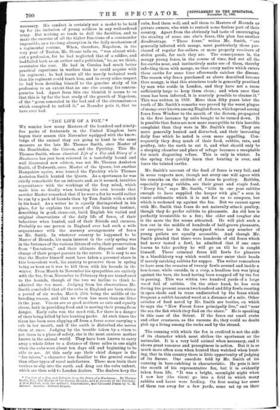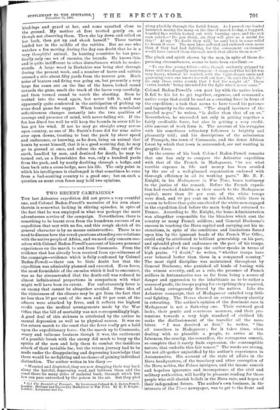" THE LIFE OF A FOX." *
WE wonder how many Masters of the hundred and ninety- five packs of foxhounds in the United Kingdom have begun their season this November equipped with the know- ledge of the animal they are going to hunt in the same measure as the late Mr. Thomas Smith, once Master of the Hambledon, the Craven, and the Pytchley. This Mr. Thomas Smith, whose classical Life of a Fox and Diary of a Huntsman has just been reissued in a tastefully bound and well illustrated new edition, was not Mr. Thomas Assheton Smith, of Tedworth, once Master of the Quorn, but another Hampshire squire, who bunted the Pytchley while Thomas Assheton Smith hunted the Quorn. As a sportsman he was chiefly remarkable for an intimate and, as it seemed, intuitive acquaintance with the workings of the foxy mind, which made him so deadly when hunting his own hounds that another Master remarked that if he were a fox he would rather be run by a pack of hounds than by Tom Smith with a stick in his hand. As a writer he is equally distinguished in his place, for he explains the secret of this hunting instinct, describing in good, clean-cut, lucid English his varied and original observations of the daily life of foxes, of their behaviour when hunted, and of their friends and enemies. Probably no one person in England ever had such a wide acquaintance with the nursery arrangements of foxes as Mr. Smith. In whatever country he happened to be Master of Hounds, his main interest in the early spring was in the fortunes of the various litters of cubs, their preservation from "fox-takers," and their ultimate disposal under the charge of their proper parents in the covers. It is easy to see that the Master himself must have taken a personal share in this benevolent work, his anxiety to preserve them in spring being as keen as it was to kill them with his hounds in the winter. From March to November his sympathies are entirely with the fox, from November to February they are transferred to the hounds, though of the two we incline to think he admired the fox most. Judging from his observations Mr. Smith concluded that all the cubs in England are born within a. period of six weeks, March 25th being the middle of the breeding season, and that no vixen has more than one litter in the year. Vixens are as good mothers as cats and equally clever, both in providing food and in moving their young from danger. Early cubs run the most risk, for there is a danger of their being killed by late hunting packs. At such times the vixen has been seen slipping off from a furze cover carrying a cub in her mouth, and if the earth is disturbed she moves them at once. Judging by the trouble taken by a vixen to put them in a place of safety, she is the most anxious mother known in the animal world. They have been known to carry away a whole litter to a distance of three miles in one night when the cubs were about ten days old and beginning to be able to see. At this early age their chief danger is the " fox-takers," a character less familiar to the general reader than other types of rural malefactors. These men train their terriers to slip into the earth and drag out the cubs unhurt, which are then sold to London dealers. The dealers keep the • The Life of a Fox, and Extracts from the Diary of a Huntsman. By Thomas Smith, Esq.. late Master of the Craven Hounds, and at present of the Pytchley. A New Edition, with the author's Illustrations, and Coloured Plates by G. H. Jalland. London : Edward Arnold.
cubs, feed them well, and sell them to Masters of Hounds or private owners, who wish to restock some fogless part of their country. Apart from the obviously bad taste of encouraging the stealing of some one else's foxes, this plan has another disadvantage. " These foxes," writes Mr. Smith, " are generally infected with mange, most particularly those pur- chased of regular fox-sellers, or more properly receivers of stolen goods, for such they are. The consequence is, the mangy young foxes, in the course of time, find out all the fox-earths near, and instinctively make use of them, thereby infecting them with mange, so that every native which enters these earths for some time afterwards catches the disease. The reason why foxes purchased as above described become thus mangy, is that this atrocious trade is generally practised by men who reside in London, and they have not a room sufficiently large to keep them clean ; and when once that room has been infected, it is scarcely possible to cleanse it." This was written in 1838. More than fifty years later the truth of Mr. Smith's remarks was proved by the worst plague of mange ever known among English foxes, which spread among foxes from Windsor to the mouth of the Severn, propagated in the first instance by cabs bought to be turned down. It is possible that foxes are now more susceptible to this horrible complaint than they were in Mr. Smith's time. They are more generally hunted and disturbed, and their increasing daily fear which he noted is even more appalling. Con- sequently they drag much of their food, rabbits, rats, and poultry, into the earth to eat it, and what should only be a sleeping chamber and place of refuge becomes a receptable for much disgusting refuse. This is only in winter. In the spring they quickly learn that hunting is over, and leave the tainted earths.
Mr. Smith's account of the food of foxes is very full, and in some respects new, though not every one will agree with his remarks on the attitude of foxes to poultry. Rabbits, especially young rabbits, are their great and staple food. "Every fox," says Mr. Smith, "kills in one year rabbits enough to have supplied the keeper with gin," a sum in rustic arithmetic which it is not for us to compute, but which is reckoned up against the fox. But we cannot agree with Mr. Smith that foxes do not naturally attack poultry, though they do prefer rabbits to pheasants. An old hen is perfectly irresistible to a fox; the older and tougher she is the more the fox seems attracted. He will pick such a hen out in the middle of hundreds of half-grown pheasants, or surprise her in the stackyard when any number of young pullets are equally accessible. And though Mr. Smith pleaded that there were hundreds of old foxes which had never tasted a fowl, he admitted that if one once learns to take poultry he will go on till he is caught himself. These criminal foxes kill fowls for pleasure in a bloodthirsty way which would never enter their heads if merely catching rabbits for supper. The writer remembers to have seen the remains of twenty fowls around and inside a hen-house, while outside, in a coop, a headless hen was lying against the bars, the head having been snapped off by the fox in passing. This was within two hundred yards of a large wood full of rabbits. On the other hand, he has seen during the present season two hundred and fifty fowls roosting in open sheds and in trees undisturbed by the foxes which frequent a rabbit-haunted wood at a distance of a mile. Other articles of food noted by Mr. Smith are beetles, on which he says the "New Forest foxes principally live," and "near the sea the fish which they find on the shore." He is speaking in this case of the Solent. If the foxes eat small crabs and other crastacea, as the racoons do, they could no doubt pick up a living among the rocks and by the strand.
The cunning with which the fox is credited is not the side of its character which most strikes the sportsman or the naturalist. It is a very bold animal when necessary, and it shows great resource and promptness in action. But it is so much more often seen when hunted than watched when hunt- ing, that in this country there is little opportunity of judging of its finesse. One anecdote told by Mr. Smith of its cunning in bare-catching is characteristic. He puts it into the mouth of his representative fox, but it is evidently taken from life. "It was a bright, moonlight night when I saw her (the vixen) go into a field in which many rabbits and hares were feeding. On first seeing her some of them ran away for a few yards, some sat up on their bind-legs and gazed at her, and some squatted close to the ground. My mother at first trotted gently on, as though not observing them. Then she lay down and rolled on her back, then got up and shook herself." These tactics landed her in the middle of the rabbits. Bnt no one who watches a fox moving daring the day can doubt that he is a very thoughtful animal. In hunting countries he has prac- tically only one set of enemies, the hounds. He knows this, and is quite indifferent to other disturbances which be under- stands. A large wood in Berkshire was being shot through during the present week, and a number of hares and rabbits crossed a ride about fifty yards from the nearest gun. Much noise of beaters and firing was going on, but presently a very large fox came out on the line of the bares, looked round towards the guns, smelt the track of the hares very carefully, and then turned round to watch the shooting. Soon he trotted into the wood again, but never left it, and was apparently quite contented in the anticipation of picking up some dead game for supper. When hunted this nonchalant reflectiveness changes instantly into the two qualities of courage and presence of mind, with never-failing wit. If the fox has dined too well he will keep the hounds in cover till he has got his wind. If not he may go straight away across open country, as one of Mr. Smith's foxes did for nine miles over open downs, trusting to beat the pack by sheer speed and endurance, or knowing, as he does, being an animal that hunts by scent himself, that it is a good scenting day, he may go to ground at once, and refuse the risk. Dug out of the earth, handled by men, and destined for death, he may be turned out, as a Dorsetshire fox was, only a hundred yards from the pack, and by neatly doubling through a hedge, and then back into a cross-hedge, save his life. The only point in which his intelligence is challenged is that sometimes he runs from a bad-scenting country to a good one; but on such a question as scent even foxes may hold two opinions.























































 Previous page
Previous page